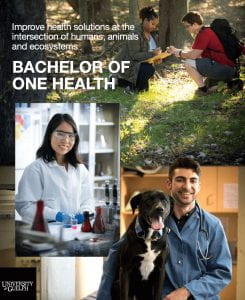The Bachelor of One Health (BOH) Program
Improve health solutions at the intersection of humans, animals, and ecosystems.


In this degree, you will seek solutions to society’s most complex health challenges such as infectious diseases, food insecurity, climate change, and biodiversity loss using an interdisciplinary, collaborative approach.
One Health is composed of three pillars – human health, animal health and ecosystem health – and operates on the premise that lasting solutions to health challenges can only be achieved by considering them in concert.
Through the One Health degree, you will become an interdisciplinary problem solver. You will develop a working knowledge of interactions among humans, animals, and their environments, and an appreciation of diversity and the social and scientific determinants of health.
Using systems thinking, creativity, communication, and collaboration, you will evaluate the impact of these factors on health outcomes for individuals, populations, and ecosystems, and inform future health practices and policy.
With teaching and research strengths in environment and biodiversity, anthropology and geography, animal and wildlife biology, veterinary and human health science, and culture and community engagement, the University of Guelph is ideally placed to provide the breadth and depth of expertise needed to succeed in this rapidly emerging field.
Degree Structure
Area of Emphasis
A selection of courses that dive deeper into the uses and application of one health approach
Choose from:
- Disease, Complexity & Health (DCH)
- Environment, Food & Health (EFH)
- Policy, Economics & Health (PEH)
- Culture, Society & Health (CSH)
Free Electives
Choose electives that complement the One Health degree or add a minor in science, social sciences, arts, or business

Sample core courses:
- Biological Concepts of Health
- Human Impact on the Environment
- Physiology
- Biological Anthropology
- Epidemiology
One Health Core Spine
Four One Health Courses that will develop core skills and integrate the social and scientific perspectives of One Health
First Year Courses
Semester 1 Fall
- ANTH*1120 Biological Anthropology
- BIOL*1080 Biological Concepts of Health
- BIOL*1090 Introduction to Molecular and Cellular Biology
- GEOG*1220 Human Impact on the Environment
For Disease, Complexity & Health (DCH) and Environment, Food and Health (EFH)
- CHEM*1040 General Chemistry I
For Policy, Economics and Health (PEH) and Culture, Society and Health (CSH) choose one of:
- ECON*1050 Introductory Microeconomics
- PSYC*1000 Introduction to Psychology
Semester 2 Winter
- ANTH*1150 Introduction to Anthropology
- BIOL*1070 Discovering Biodiversity
- ONEH*1000 Introduction to One Health
- 0.50 Elective or MATH*1080 Elements of Calculus I
For Disease, Complexity & Health (DCH) and Environment, Food and Health (EFH)
- CHEM*1050 General Chemistry II
For Policy, Economics and Health (PEH) and Culture, Society and Health (CSH) choose one of:
- ECON*1050 Introductory Microeconomics
- PSYC*1000 Introduction to Psychology
Click below to see the complete course schedule:
Unique courses within the program:
ONEH*1000 Concepts of One Health [0.50]
This course introduces One Health, an approach to understanding, managing and mitigating local and globally complex societal challenges at the intersection of human, animal and environmental health.
ONEH*2000 Case Studies in One Health [0.50]
Students will critically examine a series of case studies in One Health such as emerging infectious and foodborne diseases, climate change and resource management policy; biodiversity and human health, and food security. Each case will involve an analysis of the sociocultural and scientific context, background concepts and methodologies, strengths and challenges associated with past practices, decision making processes, and identification of future opportunities for implementing a One Health approach.
ONEH*3000 Topics in One Health [0.50]
Students will examine an emerging or topical issue in One Health from the perspective of a selected area of emphasis. Students will explore the potential value and impact of a One Health approach within one area of emphasis and contrast that with current practices.
ONEH*4000 Applications in One Health [0.50]
This course is a capstone experience for One Health students that will incorporate knowledge, skills and practices introduced and re-enforced throughout the One Health program. Students work in teams to explore and address an authentic, One-Health problem using an integrative and interdisciplinary approach. Topics could include emerging disease and public health policy; biodiversity and land planning; climate change and agricultural practices. Students will explore the underlying basis for the problem, the current state of understanding, social implications, and develop an original ‘solution’ in collaboration with key stakeholders on- and off-campus.
Co-op Option Available
The Co-op program in One Health is a five-year program, including three work terms. Students can apply directly from high school into the co-op program or apply to transfer into the degree following their 4th academic semester. The proposed program includes three work terms following the completion of their third year of study. This will allow students to have gained key transferrable skills and a more in-depth knowledge of the One Health approach. Students will be eligible for work terms that are 4, 8, or 12 months in length or any combination of work terms that leads to the completion of 12 months of work experience.
Students in co-op are required to complete work term reports which will entail a deliberate reflection on skill development, descriptions of application of a One Health approach, technical skills, or specific concepts related to One Health, and reflection on personal and professional skills development and career planning.
| Year | Fall | Winter | Summer |
|---|---|---|---|
| 1 | Academic Semester 1 | Academic Semester 2 | Off |
| 2 | Academic Semester 3 | Academic Semester 4 COOP*1100 (Course) | Off |
| 3 | Academic Semester 5 | Academic Semester 6 | COOP*1000 Work Term |
| 4 | COOP*2000 Work Term II | COOP*3000 Work Term III | Off |
| 5 | Academic Semester 7 | Academic Semester 8 | N/A |
Example Co-op Positions
- Health Product and Food Junior Evaluator – Health Canada
- Health Systems Strategy and Integration Planning – Central West Local Health Network
- Flu Watch – Public Health Agency of Canada
- Species At Risk Assistant – Royal Botanical Gardens
- International Development Officer – Global Affairs Canada
- Junior Analyst – Plant Research and Strategies Canadian Food Inspection Agency

Experiential Learning Opportunities
- The coop program provides a portion of students with a sustained opportunity to learn within a workplace setting.
- Fourth year One Health course will involve external partners and provides a simulated workplace experience.
- Additional experiential learning courses outside the required courses including the Internship in Biological Science, or the interdisciplinary Ideas Congress (ICON) course (UNIV*4200) through their electives.
- Independent study and research courses, where students work one-on-one with a faculty member to investigate a specific research problem or question.
- Field courses going to the high arctic, east coast of Canada, or even international opportunities are available.
Careers: What can you do with a degree in OH
The One Health degree will provide the skills, knowledge and abilities to succeed in research or as a practitioner in the fields of human or animal health, agri-food, health technology, health promotion and environmental stewardship across private industry, governmental and non-governmental organizations. Students are also well prepared pursue professional programs including human or veterinary medicine, law, or enter graduate work.
Sample Careers
- Public Health
- Policy Analyst – environmental, health, economics
- Community Engagement Manager for Addiction and Mental Health
- Resource Management and Conservation
- Food Security Officer

Contributing Colleges and Departments
- College of Biological Science
- College of Social and Applied Human Sciences
- Ontario Agricultural College
- Ontario Veterinary College



